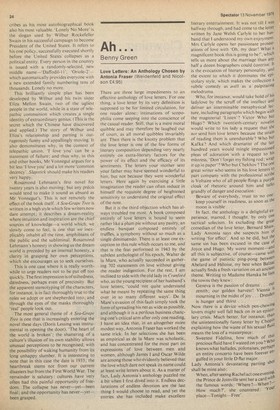Ah • • .
Benny Green
Love Letters: An Anthology Chosen by Antonia Fraser (Weidenfeld and Nicolson £4.95)
There are three large impediments to an effective anthology of love letters. For one thing, a love letter by its very definition is supposed to be for limited circulation, for one reader alone; intimations of scopo philia come seeping into the conscience of the casual reader. Still, that is a mere moral quibble and may therefore be laughed out of court, as all moral quibbles invariably are. Then there is the knotty problem that the love letter is one of the few forms of literary composition depending very nearly entirely on extra-literary factors for the power of its effect and the efficacy of its sentiments. The letters your mother sent your father may have seemed wonderful to him, but not because they were wonderful letters. Here again by exercising a little imagination the reader can often induce in himself the requisite degree of heightened sensitivity to understand the original effect of the note.
But it is the third objection which has always troubled me most. A book composed entirely of love letters is bound to -seeM rather like a plum pie without any pastry, an endless banquet composed entirely of truffles, a symphony without so much as a single diminuendo. There is at least one exception to this rule which occurs to me, and that is the feat performed in 1943 by the subtlest anthologist of his epoch, Walter de la Mare, who actually succeeded in gathering 702 statements on love without giving the reader indigestion. For the rest, I am inclined to side with the old lady in Cranford who, as the young recipient of her husband's love letters, 'could not quite understand what he meant by repeating the same thing over in so many different ways'. De la Mare's evasion of this fault simply took the form of spreading his net as wide as possible, and although it is a perilous business chancing one's critical arm after only one reading, I have an idea that, in an altogether more modest way, Antonia Fraser has worked the same trick. In her selections she has been as empirical as de la Mare was scholastic, and has concentrated for the most part on expressions of love between men and women, although James I and Oscar Wilde are among those who evidently believed that the love which dare not speak its name could at least write letters about it. As a matter of fact, Lady Antonia's anthology puzzled me a bit when I first dived into it. Endless declarations of endless devotion are the last thing I would choose to read, and yet the entries she has included make excellent literary entertainment. It was not till I was halfway through, and had come to the letter written by Jane Welsh Carlyle to her husband that I understood my own enjoyment.
Mrs Carlyle opens her passionate protest
ations of love with 'Oh, my dear! What a magnificent book this is going to be!', which tells us more about the marriage than anY half a dozen biographers could Contrive. It is the evocation of literary personality, and
the extent to which it dominates the ePlstolary style, which makes the collection a subtle comedy as ,well as a palpitating melodrama.
Who, for instance, would take hold of his ladylove by the scruff of the intellect and deliver an interminable metaphysical lecture, including paragraphs which begin with the magisterial 'Listen'? Victor Who but Hugo? Which twentieth-century novelist would write to his lady a request that she not send him love letters because the strain of reading them is unendurable? Who but Kafka ? And which dramatist of the last hundred years would mingle impassioned pleas of adoration with a request to his mistress, 'Don't forget my fishing rod; wraP it up in paper"? Who but Chekhov ?The one great writer-who seems in his love letters to part company with the professional scribe is Voltaire who of all people flings a purple cloak of rhetoric around him and talks grandly of danger and execution :
Beware of everybody, trust to no one: keep yourself in readiness, as soon as the moon is visible . .
In fact, the anthology is a delightful experience, marred, I thought, by only one tactical solecism. In excluding the great comedian of the love letter, Bernard Shaw. Lady Antonia says she suspects him of writing 'for effect'. And so he did, but the same sin has been excused in the case 01. Joyce and Hugo. My worst moment—and all this is subjective, of course—came with the game of pietistic ping-pong between A belard and Heloise, my best when Balzae actually finds a fresh variation on an ancient theme. Writing to Madame Hanska he lists the towns they knew: Geneva is the passion of dreams . . • ou.r zenith; our golden harvest! Vienna Is mourning in the midst of joy ... Dresden is hunger and thirst . . . Now there is a device which pen-chewing lovers might well fall back on in an epistolary crisis. Much better. for instance, than the unintentionally funny letter by ChoP.In explaining how the waste of his sexual fluid means the loss of a masterpiece: Sweetest Fidelina, how Much of that precious fluid have I wasted on you? Wh° knows what ballades, polonaises, perhaPs an entire concerto have been forever engulfed in your little D flat major. Lady Antonia's devastating parting sh°t shall be mine also: When, after seeing Rachel act one evening' the Prince de Joinville sent her a card with the famous words: 'Where ?—When ?--"" How much ?', she countered: 'Your
place--Tonight Free'.


































 Previous page
Previous page